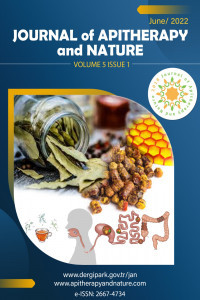The Effects of Propolis on Growth Performance of Broiler Chickens
The Effects of Propolis on Growth Performance of Broiler Chickens
Propolis, Broiler Chickens, Growth Performance,
___
- 1. Chegini S, Kiani A, Rokni H (2018) Alleviation of thermal and overcrowding stress in finishing broilers by dietary propolis supplementation. Italian Journal of Animal Science 17: 377-385.2 Sugiharto S (2016) Role of nutraceuticals in gut health and growth performance of poultry. Journal of the Saudi Society of Agricultural Sciences 15: 99-111.
- Yayın Aralığı: Yılda 2 Sayı
- Başlangıç: 2018
- Yayıncı: Oktay YILDIZ
Some Apitherapeutic Properties of Chestnut Propolis
Sevgi KOLAYLI, Saliha EKSI, Zihni YAZICI, Oktay YILDIZ, Hüseyin SAHIN, Zehra CAN, Sengül KARAOGLU
Soumaya TOUZANI, Sleman KADAN, Abdalsalam KMAIL, Bashar SAAD, Badiaa LYOUSSI
Hugo ALVES, Catarina PASSÃO, Maria João SOUSA, Cristina Almeida AGUIAR, Ana CUNHA, Rui Pedro OLIVEIRA
Thirteen Flavonoids from Green Propolis from Minas Gerais, Brazil, Analyzed for Six Years
M. D. FREITAS, G. A. LOPES, N. A OLIVEIRA, B. M. ALMEIDA, S. R. L. ABREU, R. C. BASQUES, N. S. BINDA, S. M. FIGUEIREDO
Can Propolis Inhibit Infection Dynamics of Honey Bee (Apis mellifera L.) Viruses in vitro?
An Exploration into the Relationship Between Propolis Production and Trypanosome Burden
Tim REGAN, Mark BARNETT, Tom FREEMAN
Mihaela NICULAE, Laura STAN, Adriana URCAN, Timea DOMOKOS, Daniel S. DEZMIREAN, Otilia BOBIS
The Effects of Propolis on Growth Performance of Broiler Chickens
İvana KLARIC, Matija DOMACINOVIC, Berislav PRAKATUR, İvan MISKULIN, Bozica LACHNER, Dalida GALOVIC, Danijela SAMAC
Hristo PETKOV, Boryana TRUSHEVA, Milena POPOVA, Vassya BANKOVA
Erzsébet-timea DOMOKOS, Adriana URCAN, Liviu Alexandru MARGITAS, Daniel Severus DEZMIREAN, Otilia BOBIS
